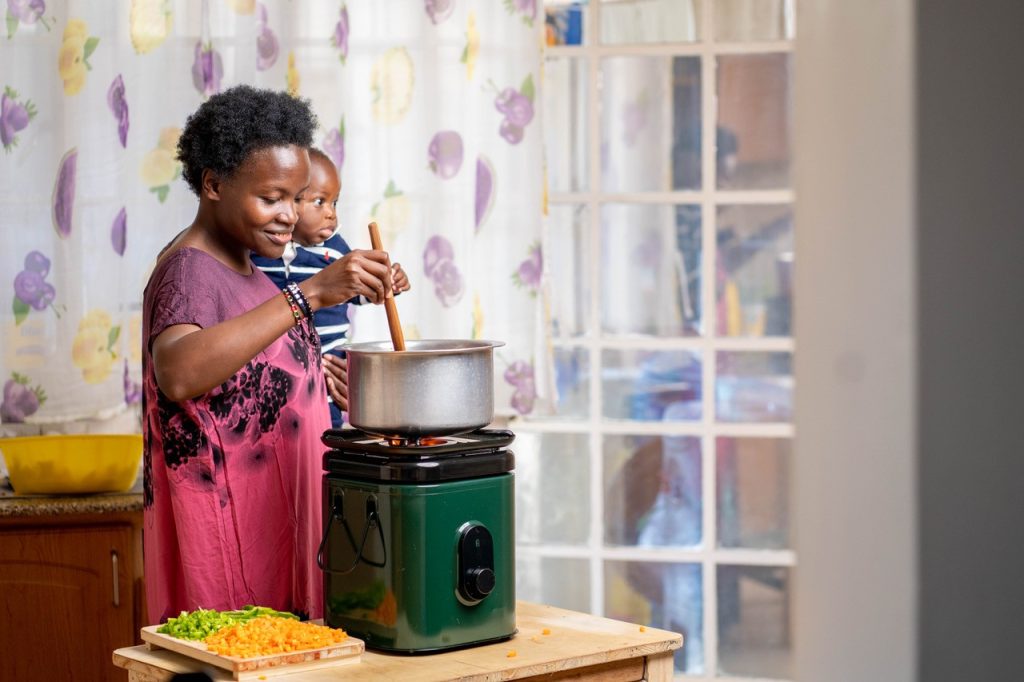What is SOLCO?
SOLCO, the Solar-Electric Cooking Partnership, is a multi-stakeholder ecosystem aimed at catalyzing the transition from biomass-based cooking methods to solar-powered electric cooking or hybrid e-cooking in displacement communities across the globe (refugees and host communities). This partnership brings together NGOs, private sector companies, financial institutions, and government agencies and is the refugee-focused initiative of the Global Electric Cooking Coalition (GeCCo). SOLCO’s primary goal is to enable access to clean, affordable, and efficient e-cooking solutions for at least 250,000 households by the end of 2027.
Why is SOLCO necessary?
Health and Environmental Impact:
Most of the over 120 million forcibly displaced people, plus their host communities, rely on traditional biomass for cooking, leading to serious health issues due to indoor air pollution and contributing to deforestation and climate change. SOLCO aims to address these pervasive problems by providing healthier, more sustainable
alternatives.
Economic Implications: Traditional cooking fuels are increasingly expensive and unsustainable. Solar-powered electric cooking offers a cost-effective solution that reduces household energy expenses and fosters economic resilience.
Multi-stakeholder Approach: The complex nature of transitioning entire communities to new technologies necessitates a collective action approach. SOLCO leverages the strengths and resources of various sectors and individual partners organizations to ensure holistic solutions that address technical, financial, and social aspects of adoption. This collaborative model, orchestrated by an independent systemic intermediary, ensures that all necessary infrastructures, policies, and financial mechanisms are aligned to support widespread adoption at the systemic level (and not support a single pre-defined solution).

SOLCO launched at Africa Climate Week, COP28, Davos, and anchored as a multi-stakeholder partnership pledge to the Global Compact for Refugees

SOLCO Partners implement pilot programs
in Uganda and Kenya, building partnerships and testing scalable solutions in refugee-hosting communities.

Expand operations to Rwanda, Nigeria, Zambia, Ethiopia, South Sudan, Chad, Burundi, and Malawi, strengthening regional impact and outreach.

Aiming to scale operations to serve 250,000 households, fostering green jobs and sustainable cooking across refugee and host communities in several additional countries including Zambia, Ethiopia, South Sudan, Chad, Burundi, and Malawi
Core Challenges
Cooking Emissions
Billion people cook with dirty biomass
Traditional cooking methods contribute significantly to global CO2 emissions, exacerbating climate change.
Gender Inequality
Time-consuming cooking methods force girls out of school, hindering education and perpetuating gender-based violence.
Health Impacts
Cooking emits 25% of black carbon, 1 billion tonnes of CO2 annually, harming health, biodiversity, and the environment.
What SOLCO Partners concretely do
Innovation and Technology
Introducing solar electric cooking technologies, SOLCO integrates cutting-edge solutions that are not only environmentally friendly but also align with modern energy needs. Technologies such as digital monitoring, reporting, and verification (dMRV) systems ensure that the adoption of these technologies can be efficiently managed and scaled.
Financial Models and Incentives:
SOLCO is leveraging innovative financing models, such as microfinancing, results-based financing, public debt swaps, to make solar electric cooking systems accessible to all, particularly in low-income settings. This includes levering high integrity dMRV-enabled carbon credits to provide additional financial incentives to households by effectively turning their CO2 emissions into sellable assets.
Capacity Building and Education:
SOLCO emphasizes the importance of community engagement and capacity building, educating communities about the benefits of solar electric cooking and how to effectively use and maintain new technologies. This grassroots approach, led by non-profit community based partners such as refugee-led organizations (RLOs), ensures long-term adoption and success.
Policy Advocacy:
By working with governmental and regulatory bodies,
particularly through UNEP, SOLCO advocates for inclusive policies that support the adoption of clean cooking technologies.
Join Our Movement
Act now, collaborate, and invest to transform lives with clean, solar-powered cooking solutions for a healthier planet.

Global Urgency
Transitioning to solar-powered cooking is essential for health, the environment, and the economy. SOLCO offers a pathway for global action, and your action can be part of the solution.

Engagement and Partnership
Policymakers, private leaders, and advocates can join forces to champion clean, efficient, and sustainable cooking solutions for communities worldwide.

Financing as Key
Investors can drive change by funding solar-cooking companies, supporting carbon credit agreements, and making sustainable cooking solutions accessible to households.
How to Get Involved!
Act now, collaborate, and invest to transform lives with clean, solar-powered cooking solutions for a healthier planet.
About
SOLCO aims to transform cooking by converting over 250,000 homes in last mile communities, including refugees, to solar-electric cooking by 2027.
Important Links:
Contact us
Focal Person
Brian Kinuthia: Regional Program Manager, Last Mile Climate.
Email: brian@lastmileclimate.org

